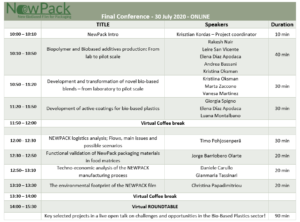NewPack final conference – 30th July
Natural polymers have been around and used for thousands of years, which then have been gradually replaced mostly by fully synthetic plastics since the mid of 19th century. With the continuously evolving science and technology of polymers a number of different engineered plastics have been developed and produced in massive quantities reaching nearly 370 million tons in 2019). As polymers offer cheap, lightweight and durable alternatives to other common materials such as glass, metals, wood and even paper, we use those practically everywhere in our life, albeit there is another side of the coin. Common plastics are made from fossils, typically oil or natural gas, and are often difficult to recycle or properly dispose. In the best-case scenario, items made of these plastics are reused a few times, maybe recycled or simply incinerated by the end of their life-cycle, but most of them ends up in land-fills of junk-yards or waits for thousands of years of very slow decomposition somewhere else in our nature making lots of damage in its flora and fauna. To solve the aforementioned environmental problems, one utopian route would be not using plastics. Another, more realistic approach is to provide valid fully sustainable alternatives that are made from renewable materials, and once reaching their end of life are easy to be recycled/valorized or can biodegrade without leaving even their traces behind. This is a complex task to be solved, and requires joint efforts of stakeholders to find and place each puzzle piece into the right place. Having NewPack participating in the game with upscaled production of bioplastics made from renewable resources for food packaging is an important step forward in achieving a greener future, and thus we are glad to discuss the present and future of the field together in our final conference.

